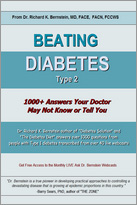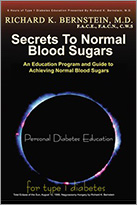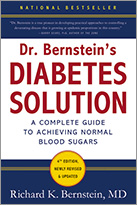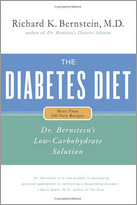by Stephen Freed, BSPharm
Until last week, researchers, doctors and every medical professional has believed for decades that if people with diabetes lowered their blood sugars to normal levels, they could not only prevent the complications from diabetes, but also reduce the risk of dying from heart disease. But the Accord Study, (for Action to Control Cardiovascular Risk in Diabetes), a major NIH study of more than 10,000 older and middle-aged people with type 2 diabetes has found that lowering blood sugar actually increased their risk of death.
As a medical professional, diabetes educator, and publisher of diabetesincontrol.com, I have received over a 100 calls and emails from my patients and other medical professionals, asking me what we should be doing or how do we answer the question from patients: Do I still need to be aggressive in trying to get my blood sugars to normal?
Due to the surprising results of the ACCORD study, they abruptly halted that part of the study which aggressively tried to manage blood sugars to normal levels, which calls into question just how patients with type 2 diabetes should be managed.
In the study, those participants who were randomly assigned to get their blood sugar levels to normal, there were 54 more deaths due to heart attacks than the other group where the levels were less controlled. They were in the study for more than four years, before they halted the intensive blood sugar lowering and were put on the less intense treatment.
What has not been called into question is the fact that normal blood sugars still protect against the common complications of diabetes, as blindness, kidney failure and limb amputation. Now we have to ask the question, can aggressive lowering of blood sugars increase the risk for heart attacks? With the new information from this study, the experts are stunned and confused. So let’s not jump to any conclusions at this point, until we look deeper into the study. The information from this study should not cause patients to relax their vigilance in lowering their blood sugars and as medical professionals we should not be telling our patients to ease off in controlling their blood sugars.
All the studies prior to this study have not tested the hypothesis that lowering blood sugars to normal, which is an A1c of below 5%, was beneficial. This is probably due to the fact that it could be difficult to do when eating high carbohydrate diets, which requires massive doses of medication. So all the prior studies only reached levels of A1c’s of above 6.4% Even in this study, the average A1c reached was 6.4% , well above normal levels.
Remember that the patients in this study, the average age was 62 who had had diabetes for an average of 10 years, who had higher then average blood sugar levels, and who also had heart disease or had other conditions as high blood pressure and high cholesterol. They were also on other medications for cholesterol and high blood pressure.
Study patients were randomly assigned to one of three types of treatments: one comparing intensity of blood sugar control; another comparing intensity of cholesterol control; and the third comparing intensity of blood pressure control. The cholesterol and blood pressure parts of the study are continuing.
ACCORD participants will continue to receive blood sugar treatment from their study clinicians until the planned trial conclusion in June 2009. Those participants in the intensive treatment group will now be treated to the same A1C goals as those already in the standard treatment group.
In ACCORD, intensive treatment group participants achieved, on average, A1C values lower than standard treatment group participants. Half of the participants in the intensive treatment group achieved an A1C of less than 6.4 percent, and half of the participants in the standard treatment group achieved an A1C of less than 7.5 percent. The average blood sugar levels for both groups were lower than when they entered the study.
Dr. John Buse, the vice-chairman of the study’s steering committee and the president of medicine and science at the American Diabetes Association, described what was required to get blood sugar levels low, as measured by a protein, hemoglobin A1C, which was supposed to be at 6 percent or less.
“Many were taking four or five shots of insulin a day,” he said. “Some were using insulin pumps. Some were monitoring their blood sugar seven or eight times a day.”
They also took pills to lower their blood sugar, in addition to the pills they took for other medical conditions and to lower their blood pressure and cholesterol. They also came to a medical clinic every two months and had frequent telephone conversations with clinic staff.
Those assigned to the less stringent blood sugar control, an A1C level of 7.0 to 7.9 percent, had an easier time of it. They measured their blood sugar once or twice a day, went to the clinic every four months and took fewer drugs or lower doses.
So it was quite a surprise when the patients who had worked so hard to get their blood sugar low had a significantly higher death rate, the study investigators said.
The researchers asked whether there were any drugs or drug combinations that might have been to blame. They found none, said Dr. Denise G. Simons-Morton, a project officer for the study at the National Heart, Lung and Blood Institute. Even the drug Avandia, suspected of increasing the risk of heart attacks in diabetes, did not appear to contribute to the increased death rate.
Nor was there an unusual cause of death in the intensively treated group, Dr. Simons-Morton said. Most of the deaths in both groups were from heart attacks, she added.
For now, the reasons for the higher death rate are up for speculation. Clearly, people without diabetes are different from people who have diabetes and get their blood sugar low.
It might be that patients suffered unintended consequences from taking so many drugs, which might interact in unexpected ways, said Dr. Steven E. Nissen, chairman of the department of cardiovascular medicine at the Cleveland Clinic.
Or it may be that participants reduced their blood sugar too fast, Dr. Hirsch said. Years ago, researchers discovered that lowering blood sugar very quickly in diabetes could actually worsen blood vessel disease in the eyes, he said. But reducing levels more slowly protected those blood vessels.
And there are troubling questions about what the study means for people who are younger and who do not have cardiovascular disease. Should they forgo the low blood sugar targets?
No one knows. Other medical experts say that they will be discussing and debating the results for some time.
Until they review the reasons for the increase in deaths, no changes should be made until we receive more information.




